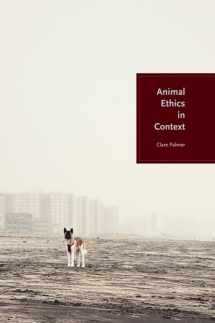
Animal Ethics in Context
ISBN-13:
9780231129046
ISBN-10:
0231129041
Author:
Clare Palmer
Publication date:
2010
Publisher:
Columbia University Press
Format:
Hardcover
216 pages
Category:
Nature & Ecology
,
Ethics & Morality
,
Philosophy
FREE US shipping
Book details
ISBN-13:
9780231129046
ISBN-10:
0231129041
Author:
Clare Palmer
Publication date:
2010
Publisher:
Columbia University Press
Format:
Hardcover
216 pages
Category:
Nature & Ecology
,
Ethics & Morality
,
Philosophy
Summary
Animal Ethics in Context (ISBN-13: 9780231129046 and ISBN-10: 0231129041), written by authors
Clare Palmer, was published by Columbia University Press in 2010.
With an overall rating of 4.0 stars, it's a notable title among other
Nature & Ecology
(Ethics & Morality, Philosophy) books. You can easily purchase or rent Animal Ethics in Context (Hardcover) from BooksRun,
along with many other new and used
Nature & Ecology
books
and textbooks.
And, if you're looking to sell your copy, our current buyback offer is $0.3.
Description
It is widely agreed that because animals feel pain we should not make them suffer gratuitously. Some ethical theories go even further: because of the capacities that they possess, animals have the right not to be harmed or killed. These views concern what not to do to animals, but we also face questions about when we should, and should not, assist animals that are hungry or distressed. Should we feed a starving stray kitten? And if so, does this commit us, if we are to be consistent, to feeding wild animals during a hard winter? In this controversial book, Clare Palmer advances a theory that claims, with respect to assisting animals, that what is owed to one is not necessarily owed to all, even if animals share similar psychological capacities. Context, history, and relation can be critical ethical factors. If animals live independently in the wild, their fate is not any of our moral business. Yet if humans create dependent animals, or destroy their habitats, we may have a responsibility to assist them. Such arguments are familiar in human cases-we think that parents have special obligations to their children, for example, or that some groups owe reparations to others. Palmer develops such relational concerns in the context of wild animals, domesticated animals, and urban scavengers, arguing that different contexts can create different moral relationships.


We would LOVE it if you could help us and other readers by reviewing the book
Book review

Congratulations! We have received your book review.
{user}
{createdAt}
by {truncated_author}


